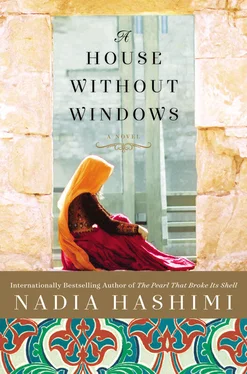“Come back, Madar!”
Zeba’s heart was pounding with the distinct feeling that her mother was in grave danger. What was this man demanding of her? They were in the middle of nowhere, essentially. No devotees had come to the shrine today, the heat driving them away. The only people who could hear Zeba’s cries were chained to their cells just as she was.
“Madar. . Madar! Don’t go, Madar!” she shouted. Her cries exploded across the yard with enough force to ruffle the leaves of the acacia tree. Gulnaz turned once more to her daughter and nodded before disappearing behind the mullah’s wooden door.
“MY SON! YOUR LIFE WILL BE LONG, MY DEAR. I WAS JUST THINKING of you when the phone rang.”
Yusuf smiled. He doubted that old superstition had much truth to it, especially not in Afghanistan.
“If I know you,” he teased, “you were probably just thinking about what a terrible son I am not to have called you in so long.”
“Eh, you know your mother well.” She sighed. “Can I help it? If I hear your voice every day, it’s still not enough for me.”
“Do you not care about your other children at all?” Yusuf fell back on his bed. It felt good to joke with his mother. Her sense of humor surprised most people.
“Sadaf is having a love affair with her cell phone, and your brother doesn’t appreciate my cooking enough to come home even once a week. As for Sitara, she’s as self-absorbed as ever. Have you spoken to her, by the way? Have you heard that you’re going to be an uncle?”
“Am I?” Yusuf exclaimed. He couldn’t imagine his sister as a mother. She and her husband still lived liked teenagers though they were both two years older than Yusuf. “Wow, that’s exciting news!”
“It is a blessing. It’ll be a bigger blessing if the child doesn’t inherit his father’s laziness. That man thinks a full day of work is moving from the bedroom to the living room.”
“Oh, Madar. He’s not that bad. He’s got a good job at the bank.”
“Yes, a bank. For a man who’s surrounded by money all day long, it’s amazing how little of it he has. He wants to buy a used crib for the baby. If your sister would have listened to us and waited, she could have been married to a doctor. Imagine how useful it would be to have a doctor in the family. My cousin in California couldn’t be happier. Her daughter just married a heart doctor. Or was it a lung doctor?”
“Maybe a plastic surgeon?” Yusuf asked sarcastically.
“Don’t even start with me. Whatever he is, he won’t have to have a child on a credit card. Anyway, enough about them. Tell me how you’re doing? Have you found a way to help that woman yet?”
Yusuf pulled himself to sitting, positioning the pillow behind him and crossing his outstretched legs at the ankle. Two other lawyers had invited him to a local restaurant for dinner, but he’d turned them down, hoping a quiet evening at home would help him come up with a brilliant way to get Zeba out of that shrine.
“I’m working on it. I can’t believe the way this case has turned out. As if the prison wasn’t bad enough, they’ve sent that woman to a shrine to treat her insanity. They’ve got her chained up and barely surviving on bread and water.”
Yusuf’s mother clucked her tongue in dismay.
“Oh, don’t tell me that! That sounds like a myth. We used to go to the shrine in Kabul but only to pray. I’d never heard of one used for the insane. Is it real?”
“It’s very real, Madar. I think it’s the only one in the country, but it just happens to be here. And that’s where she is. Afghanistan of today would surprise most Afghans who left years ago. It’s a totally different place.”
“Your father and I have been watching the satellite television more and more just because you’re there, but when we listen, sometimes I feel like they’re talking about a country I don’t know. But you’re safe? Are you eating more than water and bread?”
“I’m eating very well — maybe too well.” And he had been. He’d been hazed in his first week in Kabul, his digestive tract less accustomed to the microbiology of the country than he’d anticipated. Since then he’d had no troubles. He was still cautious with raw fruits and vegetables, but everything else moved through him normally.
“Where are you now?”
“Home,” he said, surprising himself with how reflexively the word had come out. “I mean, my apartment.”
This did feel like home, though. Yusuf had fallen into a routine. Drivers knew where to drop him off, and he could walk into a handful of shops and expect to be greeted by name. He knew which streets reeked of waste and which streets were clean. He knew the best street cart for bulanee and the places where his cell phone would get no reception.
He smiled to think of the day he’d come off the airplane, that intoxicating blend of excitement and apprehension. It was good to be here. It would be even better if he could get this case to move in the direction he wanted it to.
“So what’s going on with that poor woman? Did she tell you why she killed her husband?”
Yusuf, trained in the Western concept of attorney-client privilege, debated how much he should share with his mother. But he counted the miles between them and looked out his window at a street full of greased palms and decided there was no harm in sharing a few details with her.
“I haven’t told you what I learned yet, have I? It turns out she walked in on her husband assaulting a young girl — in the worst possible way.” Yusuf was careful with his language. There wasn’t a Dari word for rape, Yusuf had realized when he’d begun his work here, as if not naming the act would deny its existence. Even in the judicial world, it was often called zina, or sex outside of marriage, equating the crime to a lusty and impatient couple having sex the day before their wedding. Zina was a blanket term that covered anything other than a husband claiming his wife.
“Oh no! God damn that bastard!”
“Yes. She won’t tell me much, but from what I’ve put together, she killed him to defend the girl, one of her daughter’s classmates. She doesn’t want to say anything to the judge about what really happened.”
“Good for her.” Yusuf’s mother sighed. “She’s killed one person. No sense in her killing another.”
“I know, but it’s terrible that the truth can’t help her.”
“Truth is a hard sell. You know how we are. We prefer to be polite or to protect our honor. Did we ever tell anyone that we didn’t want your sister to marry that louse? No, because having a disobedient daughter is worse than having a lazy son-in-law. We couldn’t live without our lies.”
Yusuf paused to reflect on this. Lies kept the whole earth spinning on its axis. This wasn’t unique to Afghanistan.
“She’s not a bad person, Madar. She is a bit of a jadugar, though. Did I tell you about that?”
“Really? Your murderess is also a witch? A woman of many talents!”
“She’s inherited her talents from her mother, actually.”
“Where else could children get their talents from?” Yusuf’s mother said pointedly.
“Wait till I tell my father.”
“He knows it’s true. But you did get your hair from your father. You should thank him for that since he’s the only man his age who can stand outside the masjid without his head reflecting sunlight. Now, I haven’t asked in a long time because I didn’t want to be one of those mothers with her nose in her children’s business, but how are things with Meena?”
Yusuf winced. He debated telling his mother that Meena was in love with another man. He didn’t fully trust his mother not to say something about it to Khala Zainab.
Читать дальше











